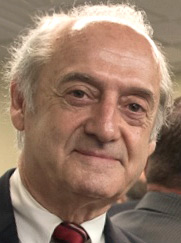/ Recently Commented
Celebrating 167 Years of Public International Law for Cyber Security
 On 30 September 1850 at Dresden, the first international treaty was issued among the first sovereign nations to internet their national electronic communication networks. It was known as the Dresden Convention, and culminated several weeks hammering out basic requirements and techniques to implement an internet spanning the Austro-German European continent at the time, and established a continuing "Union" of signatories to evolve the provisions of the treaty. more
On 30 September 1850 at Dresden, the first international treaty was issued among the first sovereign nations to internet their national electronic communication networks. It was known as the Dresden Convention, and culminated several weeks hammering out basic requirements and techniques to implement an internet spanning the Austro-German European continent at the time, and established a continuing "Union" of signatories to evolve the provisions of the treaty. more
- Anthony Rutkowski
- Comments: 3
- Views: 14,282
India Launches ‘.bank.in’ and ‘.fin.in’ Domains to Deter Financial Fraud
In a bid to bolster cybersecurity in India's financial sector, the Reserve Bank of India (RBI) has announced exclusive internet domains -- 'bank.in' for registered banks and 'fin.in' for non-banking financial entities. RBI Governor Sanjay Malhotra revealed that registrations for 'bank.in' will commence in April 2025, followed by 'fin.in', with the initiative aimed at reducing phishing attempts and fortifying digital banking trust. more
- CircleID Reporter
- Comments: 1
- Views: 73,616
Response to usTLD Registry Management and Maintenance RFI
 On January 17th in the closing days of the Biden Administration, NTIA issued the following Response for Information in connection with the .us ccTLD. While responses to the RFI will be held in confidence by NTIA per the RFI, some organizations such as M3AAWG made their response public. In the spirit of openness and transparency, Rick Lane and I are sharing our response on this important topic. more
On January 17th in the closing days of the Biden Administration, NTIA issued the following Response for Information in connection with the .us ccTLD. While responses to the RFI will be held in confidence by NTIA per the RFI, some organizations such as M3AAWG made their response public. In the spirit of openness and transparency, Rick Lane and I are sharing our response on this important topic. more
- Michael D. Palage
- Comments: 2
- Views: 37,526
RCC Pushes for State-Led Internet Governance Ahead of WSIS+20 Review
 As we approach the WSIS+20 Review, the future of Internet governance is at a crossroads. In its January 29th submission, the Regional Commonwealth in the Field of Communications (RCC) - representing Russia, Armenia, Azerbaijan, Kyrgyzstan, Uzbekistan, Tajikistan, and Rostelecom - advocates for a state-led governance model that challenges the Western-led multistakeholder approach. The submission reflects an ongoing ideological divide between sovereignty and openness in digital governance. more
As we approach the WSIS+20 Review, the future of Internet governance is at a crossroads. In its January 29th submission, the Regional Commonwealth in the Field of Communications (RCC) - representing Russia, Armenia, Azerbaijan, Kyrgyzstan, Uzbekistan, Tajikistan, and Rostelecom - advocates for a state-led governance model that challenges the Western-led multistakeholder approach. The submission reflects an ongoing ideological divide between sovereignty and openness in digital governance. more
- Pari Esfandiari
- Comments: 5
- Views: 12,402
Beyond WHOIS: Towards a New Framework of Internet Domain Registration Data Disclosure
The collection and disclosure of DNS registration data have evolved chaotically, influenced by GDPR and other privacy laws. The system, while improving privacy, has enabled bad actors and raised costs for registrars and registries. Join experts at this event as they explore Project Jake's framework for balancing privacy with legitimate data needs, emphasizing policy clarity, efficiency, and adaptability. more
- CircleID Reporter
- Comments: 2
- Views: 39,904
Fiber in the Water Pipes
 Fiber networks are getting a surprising new route: water pipes. An innovative technology promises faster, cheaper installations while avoiding traditional construction hurdles. However, concerns about water utility cooperation and repair challenges remain. This approach could revolutionize fiber deployment in municipal and greenfield communities, but its adoption hinges on proving its reliability and safety. more
Fiber networks are getting a surprising new route: water pipes. An innovative technology promises faster, cheaper installations while avoiding traditional construction hurdles. However, concerns about water utility cooperation and repair challenges remain. This approach could revolutionize fiber deployment in municipal and greenfield communities, but its adoption hinges on proving its reliability and safety. more
- Doug Dawson
- Comments: 1
- Views: 8,084
Mark Zuckerberg’s Content Moderation Overhaul: Prelude to a Fragmented Internet and a Threat to Truth
 Mark Zuckerberg's recent announcement of sweeping changes to Meta's content moderation policies marks a pivotal moment for the internet, democracy, and truth itself. The decision to replace third-party fact-checking with a decentralized "Community Notes" system and relocate trust and safety operations to Texas signals a shift in Meta's governance approach. This move is not only politically expedient but also a troubling prelude to the tech industry bowing to the political priorities of the incoming Trump administration. more
Mark Zuckerberg's recent announcement of sweeping changes to Meta's content moderation policies marks a pivotal moment for the internet, democracy, and truth itself. The decision to replace third-party fact-checking with a decentralized "Community Notes" system and relocate trust and safety operations to Texas signals a shift in Meta's governance approach. This move is not only politically expedient but also a troubling prelude to the tech industry bowing to the political priorities of the incoming Trump administration. more
- Pari Esfandiari
- Comments: 4
- Views: 14,263
Exploring the Impact of WHOIS Data Redaction on Unsolicited Emails
 In the digital age, personal data protection has become paramount, with regulations like the General Data Protection Regulation (GDPR) shaping global practices. One area significantly affected is the public availability of WHOIS data, a critical resource in the domain name system. WHOIS traditionally provided detailed contact information for domain registrants, but privacy measures have redacted much of this data in recent years. more
In the digital age, personal data protection has become paramount, with regulations like the General Data Protection Regulation (GDPR) shaping global practices. One area significantly affected is the public availability of WHOIS data, a critical resource in the domain name system. WHOIS traditionally provided detailed contact information for domain registrants, but privacy measures have redacted much of this data in recent years. more
- Tobias Sattler
- Comments: 4
- Views: 21,647
NATO’s Orbital Lifeline: A Backup Plan for the Internet
NATO’s HEIST project tackles the vulnerability of undersea internet cables by testing satellite backups and advanced monitoring. The initiative aims to safeguard global communications against accidental damage and potential sabotage. more
- CircleID Reporter
- Comments: 2
- Views: 48,163
International Law of Critical Internet Infrastructure [CII]: A Comparative Analysis
 On Friday December 13, 2024 at 10:00–12:00 CET (09:00-11:00 AM UTC) the Lodz Cyber Hub at the University of Lodz Law School, an ICANN EURALO ALS, and the United Nations University – Comparative Regional Integration Studies (UNU-CRIS) hosts an online workshop 'International Law of Critical Internet Infrastructure: A Comparative Analysis of Europe and China'. more
On Friday December 13, 2024 at 10:00–12:00 CET (09:00-11:00 AM UTC) the Lodz Cyber Hub at the University of Lodz Law School, an ICANN EURALO ALS, and the United Nations University – Comparative Regional Integration Studies (UNU-CRIS) hosts an online workshop 'International Law of Critical Internet Infrastructure: A Comparative Analysis of Europe and China'. more
- Joly MacFie
- Comments: 1
- Views: 10,849
Multistakerholderism and Its Discontents: A Reply
 Twenty years after multistakeholderism helped save the Free Internet and present-day Internet governance from a potentially existential crises, the term is again triggering some strong emotions. There are very real questions around definitions, accountability, participation, and even legitimacy in all multistakeholder models. Within Internet governance, there are declared enemies of the multistakeholder approach... more
Twenty years after multistakeholderism helped save the Free Internet and present-day Internet governance from a potentially existential crises, the term is again triggering some strong emotions. There are very real questions around definitions, accountability, participation, and even legitimacy in all multistakeholder models. Within Internet governance, there are declared enemies of the multistakeholder approach... more
- Alexander Klimburg
- Comments: 5
- Views: 13,047
A Collision Between Tech Policy and Foreign Policy: the UN Cybercrime Convention
 Sometime by year-end, the UN General Assembly (UNGA) will vote on the proposed UN Convention Against Cybercrime. The treaty is opposed by most civil liberties organizations and Internet businesses, although the US position appears uncertain, mostly for reasons of foreign policy. more
Sometime by year-end, the UN General Assembly (UNGA) will vote on the proposed UN Convention Against Cybercrime. The treaty is opposed by most civil liberties organizations and Internet businesses, although the US position appears uncertain, mostly for reasons of foreign policy. more
- Roger Cochetti
- Comments: 2
- Views: 17,654
Is Verisign a Monopoly? Does It Matter?
 Senator Elizabeth Warren and Rep. Jerry Nadler recently wrote a letter complaining that VeriSign overcharges for .com domains due to its market power. They sent it to the Department of Justice and the National Telecommunications and Information Administration (NTIA). While you can make a reasonable case that the claim is true, two more interesting questions are "Why now?" and "Why bother?" more
Senator Elizabeth Warren and Rep. Jerry Nadler recently wrote a letter complaining that VeriSign overcharges for .com domains due to its market power. They sent it to the Department of Justice and the National Telecommunications and Information Administration (NTIA). While you can make a reasonable case that the claim is true, two more interesting questions are "Why now?" and "Why bother?" more
- John Levine
- Comments: 8
- Views: 43,551
Led by Ted Cruz, the GOP Doesn’t Want Affordable Internet
 In the coming months, we're set to witness the largest investment in America's digital infrastructure in history: $42.5 billion that should be a true lifeline for millions of Americans struggling with slow, unreliable, or nonexistent internet connections. But as with any massive government spending program, the devil is in the details - and Republican lawmakers, led by Texas Senator Ted Cruz, are doing their best to ensure those details work against their own constituents. more
In the coming months, we're set to witness the largest investment in America's digital infrastructure in history: $42.5 billion that should be a true lifeline for millions of Americans struggling with slow, unreliable, or nonexistent internet connections. But as with any massive government spending program, the devil is in the details - and Republican lawmakers, led by Texas Senator Ted Cruz, are doing their best to ensure those details work against their own constituents. more
- Tyler Cooper
- Comments: 2
- Views: 31,617
Copyright Infringement: a New Worry for ISPs
 Recent court rulings hold ISPs accountable for failing to disconnect users accused of copyright infringement, sparking alarm across the industry. As record labels push for harsh penalties and ISPs warn of the potential for mass disconnections, the debate highlights the flaws of outdated copyright laws and raises critical questions about fairness, enforcement, and the future of internet access. more
Recent court rulings hold ISPs accountable for failing to disconnect users accused of copyright infringement, sparking alarm across the industry. As record labels push for harsh penalties and ISPs warn of the potential for mass disconnections, the debate highlights the flaws of outdated copyright laws and raises critical questions about fairness, enforcement, and the future of internet access. more
- Doug Dawson
- Comments: 3
- Views: 19,080